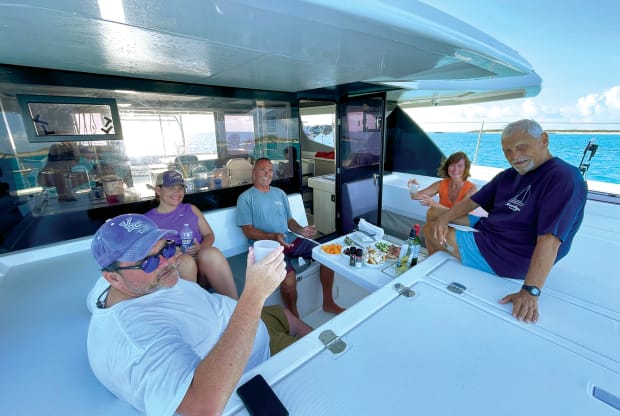
Photo by Zuznana Prochazka
I was recently asked to run a charter for friends. As non-sailors, they didn’t know what to expect or who else to invite. I suggested bareboat chartering is living with people in close quarters, sometimes in stressful situations due to weather and schedules, and that they should select the crew accordingly. They gave it a lot of thought and ended up with just a few people, as opposed to packing the boat with anyone and everyone they could think of. Good idea. If you’re the one planning a charter with friends or family, choose wisely.
To avoid surprises, outline the basics: what kind of boat will be chartered, what additional expenses there may be, what to pack and how you’re going to manage the food (including dinners ashore, which can be expensive). For newer sailors, especially, consider the possibility of seasickness.
Manage expectations. Some people want postcard-perfect scenes of white sand beaches and free-flowing umbrella drinks, and could care less about actually sailing. Some are only joining to spend time with friends. Significant others can be especially tricky. Just because your friend is a mad sailor who can go three days without a shower and is perfectly content surviving on chips and beer, that doesn’t mean his or her partner feels the same. You can’t choose your friends’ mates, but you can help their significant others get a taste of what to expect by including them as part of the organizing process from the beginning. Get an understanding of their priorities, concerns and comfort levels with various aspects of chartering. Know your crew and make sure they fully understand the type of adventure they’re in for.
Experienced Hands
If possible, be sure to bring along some fellow sailors. Not only will they already be used to the environment, they may be useful. As long as you have at least one other crewmember who can navigate and anchor, you should be fine. That said, there are other skills that can come in handy as well, so find out what your crew as a whole is capable of. Are there any mechanically handy folks aboard in case you have to change an impeller or get a stubborn pump working? Is someone really good at provisioning and cooking? Who will be your person to go forward and reef in rough conditions? Is there anyone who speaks the local language?
Outdoorsy and Adventurous
Although your group can be made up entirely of non-sailors (assuming you can handle the boat yourself) it helps if it is made up of outdoorsy types used to rougher adventures than those in which you can call down to the front desk at any time for a hair dryer. Sailing is in many ways camping on the water, even aboard larger better-outfitted vessels. People need to know how to conserve water and electricity, how to pack efficiently and how to do more with less. In exotic locales, it helps to have people who are adventurous eaters and will be open to trying exotic foods and foreign brands. Backpackers, world travelers and anyone used to the outdoors will do fine.
Less Maintenance, More Enthusiasm
Very high on your list should be putting together a group of people that will get along. Low-key, adaptable people are best. If they are low-maintenance in general, it won’t matter that they’ve never been on a boat before. Someone with an abundance of enthusiasm and a willingness to pitch in and do what needs to be done will inevitably make for a better shipmate than an experienced sailor with an attitude.
Before actually inviting anyone to take part in your next adventure, try taking them out for a daysail. As you narrow down your list, maybe even try asking a few of your prospective shipmates out for a short cruise. Spending a night or two on a boat is a very different proposition from drifting along on a warm afternoon with a cooler of beer.
To help keep the peace when your charter is underway, be sure and get people involved in all aspects of boat management so that nobody gets stuck with the same duties all the time. Invite people to help navigate, raise sails, steer, provision and so on. As in all things, the right people, good preparation, open dialog, flexibility and a sense of humor will, inevitably, not only make all the difference in the world, but ensure your next charter is an adventure and not an ordeal.
January 2022








